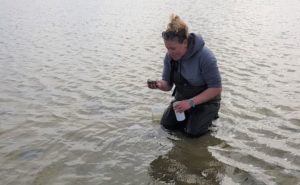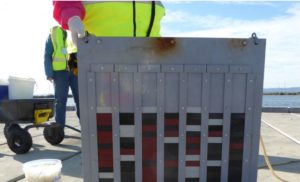
Australia’s maritime industries, including shipbuilding and marine equipment, will get a major boost via the new ARC Industrial Transformation Training Centre for Biofilm Research and Innovation based at Flinders University.
In a $5 million Industrial Transformation initiative launched by the Australian Government, the centre will attract almost $7.65 million from industry and key research partners.
The new centre will explore the microbiological complexities of biofilms commonly found on shipping vessels. Marine biofilms cause billions of dollars a year in loss of infrastructure, contamination and cleaning worldwide.
International freight and naval shipping are vital for trade and defence but are impacted by the biofouling of ship hulls, which can increase fuel consumption by 40% due to additional hull drag and poor manoeuvrability, says chief investigator, Flinders University coastal and marine expert Associate Professor Sophie Leterme.

“As well, the attachment of marine organisms to ships’ hulls facilitates their translocation around the globe, and invasive aquatic species transported in this way can threaten biodiversity and cause real economic damage when they become established in new habitats,” she says.
“Our laboratory has been working on the characterisation of biofilms on ship hulls and other marine surfaces for several years, and this new Centre will train the next wave of experts to make Australia a leader in developing and commercialising sustainable maritime platforms,” says Associate Professor Leterme, who founded the Biofilm Research and Innovation Consortium (BRIC) at Flinders University.

“The ecological ramifications from this potential new multimillion-dollar industry will be invaluable in the future when we can better manage biofouling at ports and shipping channels around the world, including Australia’s clean, safe waterways.”
Defence is forecast to spend $270 billion over this decade, a major boost to Australian advanced manufacturing.
Flinders University Pro Vice-Chancellor – Research Impact Professor John Spoehr says the new initiative will be great incentive for innovative R&D, linking scientists, postdoctoral and other students to work closely alongside industries with connections to global markets.
“This project will combine the disciplines of biology, microbiology and nanotechnology through to chemistry, functional materials, engineering and robotics.
“Researchers will work closely with partner organisations in the defence, manufacturing, water management and marine industry sectors.

“It’s an exciting opportunity for our researchers to put their world-class knowledge to the test and translate these innovations to create real-world applications and solutions to overcome major environmental, economic, defence and trade issues,” says Professor Spoehr.
Federal Minister for Education Jason Clare today unveiled the new ARC Training Centre for Biofilm Research and Innovation with five other Industrial Transformation Training Centres in a $29.3 million investment in innovative research and industry collaboration around Australia, which will collectively be supported by an additional $57.2 million in funding from partner industries and universities.

The Flinders University centre will work with industry partners, including the South Australian operations of ASC Pty Ltd, BAE Systems, DSTG and Osmoflo, other businesses and government agencies – with key universities around Australia and overseas – to tackle one of the biggest issues facing international shipping and marine environments. Other industry partners include Enware Australia, Sparc Technologies, SA Water, Franmarine Underwater Services, DMTC Molino-Zhang and Associates, Environmental Protection Authority, Australian Society for Microbiology and Australasian Corrosion Association. Research support will include experts from the University of Toulon, France and Ohio State University, US as well as the University of Tasmania and Swinburne University of Technology in Australia.

